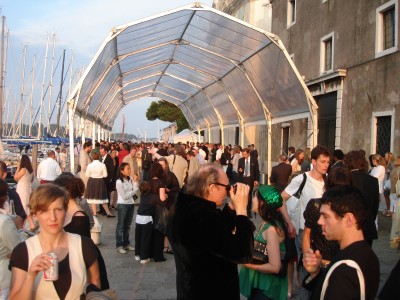The Social Scene
Venice
Venice

‘They’re out of wine. And beer. But there are Bacardi Breezers.’ The garden setting for the Ukrainian party is spectacular, the palazzo so stunning it makes grown men weep. Tucked away at a table in a corner is Elton John, quietly sucking on an oyster. Closer nearby, someone is saying the previous Biennale was way better, while her colleague retorts that it’s always better, that’s what everyone says, always. In front of me, someone is telling me how ‘brave’ I am to work in Iran. She smiles, shaking her head. ‘So brave.’ I ignore the fleeting impulse to do something to her visage, something bleak and Paul McCarthyesque, but refrain, smiling sweetly at my fingernails. This morning a headline in a local daily was proclaiming, ‘La Biennale tutti crazy!’
Venice brings out the worst in people. Friends will stand you up; colleagues will reconsider promises and principles with amazing ease; others will be watching you like you’re something they’ve discovered in their soup. To be fair, in Venice, I do the same, to nearly everyone I know. This is where Biennale anguish is heightened by a plethora of fringe events scrambling for attention with their respective palazzi; so Venice forever has you thinking you’re at the wrong place at the wrong time. There’s always an art work you’ve overlooked. Someone is bound to say you’re a cretin for missing the Hungarian Pavilion. And there’s always a better party just a vaporetto ride away.
The catalogue for this year’s Swiss Pavilion helpfully concludes that the erudition of the 19th-century ‘grand tour’ is no longer necessary for the appreciation of art as we know it. With the ‘Postmodern’ ramifications of grandtour2007.com, ‘the outdoor party has replaced “education” as the quintessence of artworld tourism’, as the critic Tan Wälchli puts it in said publication. But it remains to be shown whether the traditional studied reverence of masters and the cultural safari of today are actually mutually exclusive in habitus and epistemic regime.
Take Robert Storr, the authorial figure looming over the Biennale, with his old-fashioned earnestness and sensuous enchantment. The furrowed brow and ‘love that texture’ swoon, the old-school high-culture aficionado shtick, are hardly a challenge to the tickertape ribbons pinned to any of the private liners outside the Giardini, to press reports proclaiming, ‘a gala dinner on San Lazzaro degli Armeni island, celebrating an exhibit of work by US conceptual artist Joseph Kosuth, will be attended by Kosuth himself as well as three top movie stars’. In the past there may have been clashes between Grand Tour I and II, between educational rigour and the ‘tutti crazy’ rumpus of blockbuster tepidity, but it’s hard to imagine any inspiring frictions between them today.
That said, aren’t the ones who whine about this and then stay on for the oysters the most suspicious? There’s nothing more obnoxious than heatedly bewailing art-scene depravity, whether on palazzo porches or in the pages of frieze: critique, I hear you warn, stands a chance only when it can smile diplomatically at its fingernails. Then again. If exhibitions no longer offer the unexpected and unaccountable, maybe the pungent backstage mix of petty rancour and professional venom, all heightened by the crowded hustle on rocky boats and the self-important swagger of drink, can spark something refreshingly aggressive. A thirst for ‘regime change’, as someone with a pineapple Breezer put it? For the record, the ‘regime change’ quip was the coda to a conversation with an accomplished artist who has been cheated out of her production costs by her curator. Odd how we’re more likely to watch Elton John curate Venice than to see such situations addressed in the full light of day. Tutti crazy, if I may say so myself.
















